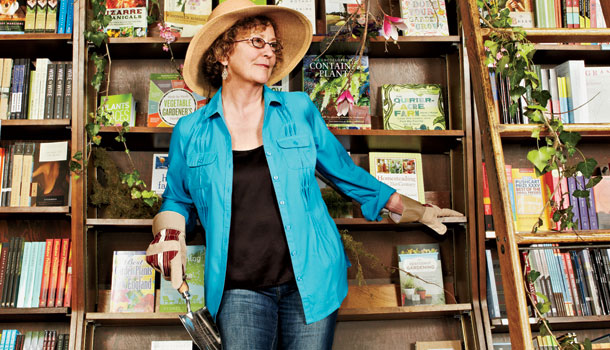Bookstores won't die, but business models are changing.
.color {color:#f7df45;}.text {color:#666;font-size:14px;font-family:arial;}.bold {text-transform:uppercase;font-size:11px;font-family:arial;}.caption {color:#666;font-size:11px;margin-bottom:15px;}.caption img {padding-bottom:2px;} Dana Brigham at her Massachusetts bookstore, tending the garden of a dead-tree industry. | Photo by Guido Vitti
Dana Brigham at her Massachusetts bookstore, tending the garden of a dead-tree industry. | Photo by Guido Vitti
 In April, Borders* said its restructuring plan included bigger cafes and more novelty products. In other words, fewer books. A shift is also happening with independent bookstores--400 of which opened in the past six years--but instead of sidelining books, they're finding new ways to promote them. Here are some of their best strategies.
In April, Borders* said its restructuring plan included bigger cafes and more novelty products. In other words, fewer books. A shift is also happening with independent bookstores--400 of which opened in the past six years--but instead of sidelining books, they're finding new ways to promote them. Here are some of their best strategies.
1//Cluster ProductsAt Brookline Booksmith in Brookline, Massachusetts, "we try to have everybody buy a book and something else," says co-owner Dana Brigham. So a third of the floor space gets ceded to products that complement nearby books: spatulas and wine stoppers next to cookbooks, say, or vases and floral stationery in the gardening section.The Payoff: The store's traffic is up about 7% within the past year, Brigham says.
2//Act LocallySquare Books in Oxford, Mississippi, casts itself as a hub of ideas--not just books--by hosting Thacker Mountain Radio, a sort of A Prairie Home Companion, on local radio. (The live audience of about 170 crams between bookshelves.) And if anyone within a mile of city limits wants a book, employees bring it to them in person. "Amazon brags about how fast they can get books to you, but we can get ours out faster," says owner Richard Howorth.The Payoff: Impossible to quantify but customer loyalty has strengthened.
3//Be A Printing Press"We wanted to give Village Books a new face," says co-owner Chuck Robinson. So in 2009 the Bellingham, Washington, store leased an Espresso Book Machine, which can print a 200-page, professional-looking book in 10 minutes. The store now produce...
[Source: Fast Company]
No comments:
Post a Comment